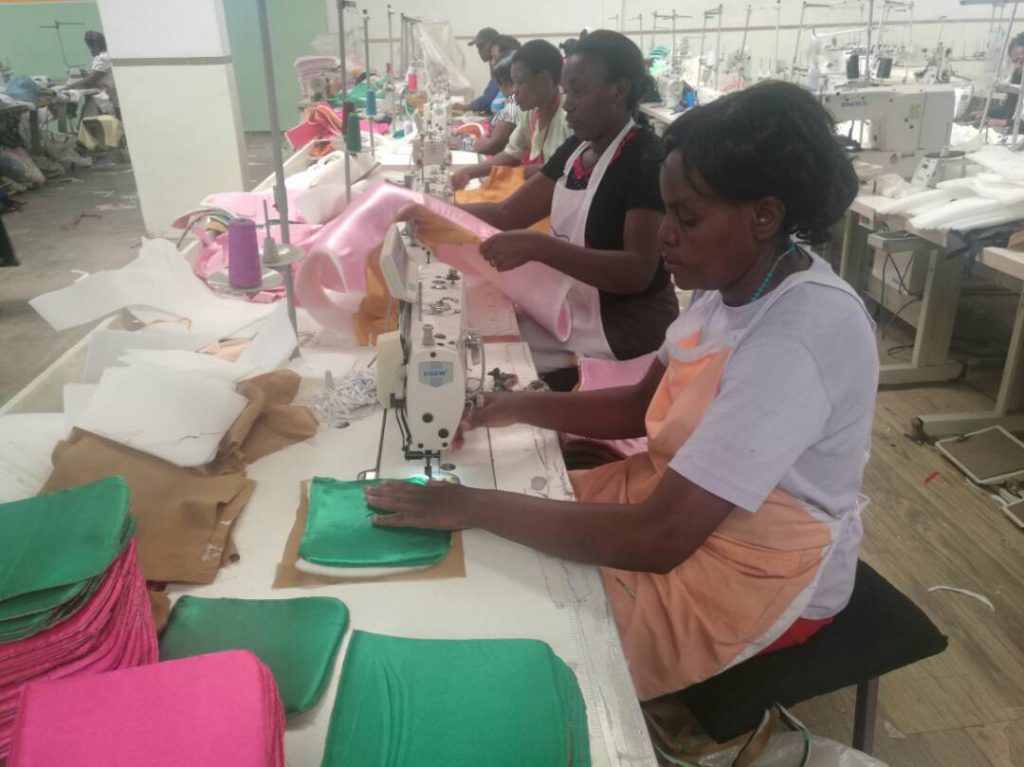Behind the dirty-blue gate just off Kangundo Road east of Kenya’s capital Nairobi, young guys and ladies work their hands every day in adjacent workshops. There are those who make baby wear, while others operate machines that produce wooden and leather products.
You won’t see anything unusual until you talk to Victor Karua, the founder of Vikrut Prerequisites Ltd, the company that runs this beehive. Vikrut, named from a combination of parts of his names and his wife’s Ruth, operates a rare model of business: it trains young people in different technical and vocational skills and, in fact, pays while they learn.
Vikrut specializes in training youth in a number of fields including: tailoring & machine operation; carpentry & woodwork; welding & fabrication; leather work; cabros (pavers) and other installations.
Victor says he began the organization to help solve the unemployment crisis in the country, now at over 40%. Either there are too many graduates chasing fewer white-collar jobs or millions of them who dropped off at various points along the education chain towards university roaming the streets looking for any job.
“We target those who don’t qualify to join university. Remember only 6 percent of those who start primary school make it to university, leaving 94% to join smaller colleges.”
With so many youth missing opportunities in mainstream colleges, Victor saw an opportunity to help provide skills to young people and make some money in the process. His model is simple: get young people looking for skills, train them and have them work to pay for their own training and upkeep, which ranges between Ksh6,000 and Ksh8,000.
Students are trained on the job and end up producing products that are sold through various contracts Vikrut has with different retailers and suppliers.
Victor targets youth aged between 14 and 24, and only those with passion and ‘most teachable’ attitude make it to the Vikrut centre. The youth are trained in tailoring and textile printing, wood work, leather and even making of cabro paving blocks.
After training some are retained to continue working for Vikrut while others are often poached by other companies. Most affected is the tailoring section that regularly losses staff to textile firms operating at the Export Processing Zones that lure them with better pay.

“We are using modern methods of hands-on training,” he said. “Job training produces competent professionals who can make our economy grow faster an that’s why they are taken up very fast by other companies. This is the training that will end up in making of a car in Kenya. The old theoretical methods are outdated.”
From humble beginnings
Victor started 30 years ago with about Ksh900 30 he saved in college while studying for a diploma in art and design. Using the little cash, he bought materials and made baby feeders by himself which he sold to shop keepers.
Soon many retailers noticed his products and orders started coming in. But there was a not-so-small problem: he could not get people with the right skills in tailoring. Frustrated, he brought in his wife to help but that was not enough. He was forced to start training his own tailors, mostly ladies.
See Also: The graduate who sleeps with her chickens in return for money
Later, he introduced wood work for young men and masonry. “On-job training enabled us to make this project sustainable as the trainers still make things that we sell,” he says. “It’s hard to train someone without cash as most of them come from very disadvantaged backgrounds.”
He said the so-called informal sector has evolved from Jua Kali to Jua Cool and now it has joined the formal industry when it comes to economic activities.
He has transformed the desperation of youth for jobs into a sustainable multi-million enterprise that is empowering hundreds of school leavers every year and making him rich.
NEXT: Seven must watch movies for entrepreneurs
Vikrut Prerequisites sets a very good example of micro-enterprise that has definitely succeeded to become medium (SME). “One does not require hefty capital to start up an enterprise. Actually, the fundamental requirement is an idea and entrepreneurship, then other requirements follow,” says Victor.
Bitter-sweet situation
On this day, Victor was not a very happy man. The tailoring section was virtually empty after losing a huge portion of 137 tailors he had trained in 2016 to EPZ firms. This requires him to go back to the slums of Kayole and Kariobangi and recruit more trainees to replace them.
It’s a bitter-sweet situation that he has become used to: give hope to guys who eventually dump you for greener pastures.
READ: Waiter who bought the hotel he worked for
“The perception has been that vocational training is for failures. Now tell me, do you see failures here,” he says, pointing to a lady using machines to shape up wooden cooking spoons, who has only basic education but is one of the machine’s operators in the wood section.
With this success, Vikrut is expanding the organization by acquiring high tech textile machines for making sweaters and socks.
More information can be found at Vikruit or http://vikrut.co.ke

















Leave a comment